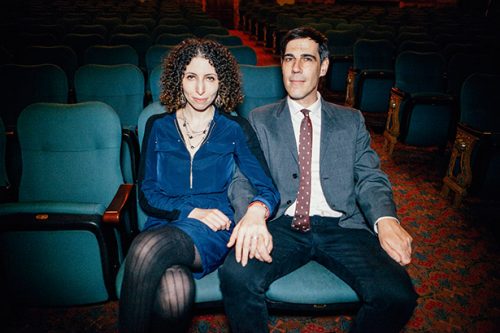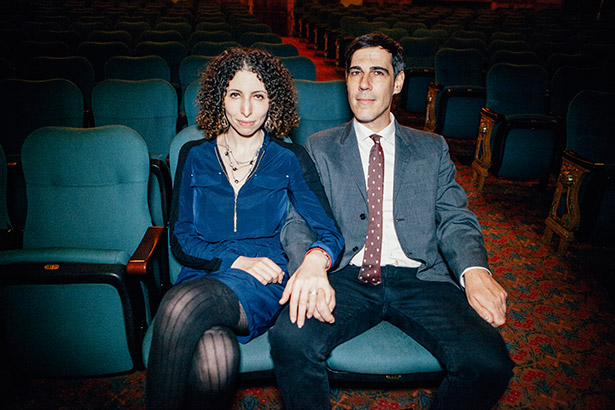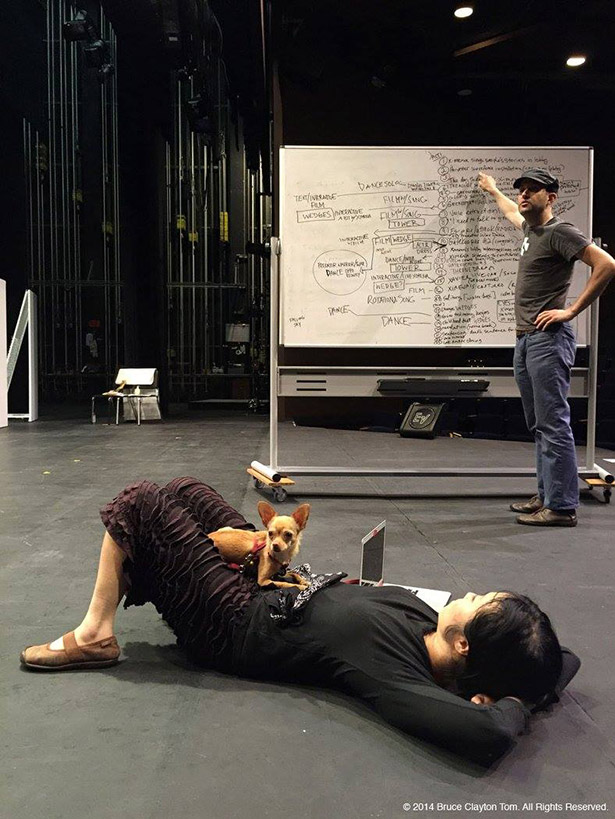
Opening night of Cloud Nine at the old Lord Leebrick Theatre, 2001: Willow Norton holds court in the lobby, trash-talking the production. Upon hearing her, the play’s director, Corey Pearlstein, emerges from the shadows and introduces himself to the young woman. Spirited discussion ensues.
Valentine’s Day, 2007, on a cobblestone street in SoHo, NYC: Snow falls in the settling dusk. As Norton scurries to rehearsal, she catches a glimpse of a man standing in the doorway. Despite his three-piece suit and the theater business he is conducting over the phone, he looks hometown familiar.
“Corey Pearlstein?” Norton asks.
He looks up and says into the phone, “It’s someone from Eugene. I’ll have to call you back.” Ending the call, he smiles. “Hi, Willow. What are you doing in New York?”
Something about the snow in New York and running into someone from home conspired to shake Norton’s dream right into conversation. What was she doing in New York? Norton’s dream, she told Pearlstein, was to learn how new theater works were created, funded and staged, so that eventually she could return to Eugene and be a part of a vibrant theater scene where she grew up.
Fast forward eight years, throw in a marriage and baby, and Pearlstein and Norton are in Eugene for the summer of 2015, inaugurating the Oregon Performance Lab.
Oregon Performance Lab (OPL) offers space and support to artists hoping to create or fine-tune new works. Utilizing the theater facilities at Lane Community College, OPL is staffed by student and community interns. In return, the visiting artists hold workshops for the public and connect interns with artists in larger theater venues across the nation.
Last August, OPL provided space for a workshop production of Spill, an original work by Leigh Fondakowski (Emmy winner and lead writer for The Laramie Project) and collaborators Reeva Wortel and Kelli Simpkins. After this, Seattle’s Degenerate Arts Ensemble staged a trial run of Predator Songstress. Local artist John Schmor held a reading of his stage adaptation of Ursula K. Le Guin’s The Left Hand of Darkness.
 |
| Willow Norton and Corey Pearlstein photographed in New York. Photo by Nicole Fara Silver. |
Along with these productions, OPL held successful public workshops: More than a dozen local actors were able to stretch their skills and eight students received intern experience with theater professionals.
Not a bad start for such an ambitious project.
“Diversity is a big inspiration,” Pearlstein says. “When you look around, where are the good roles for Latinos? Where are the roles for women?”
In encouraging new works, Pearlstein and Norton are urging theaters to catch up with the American experience. “We want to reflect the time we are in,” Norton says, noting that the demographics of our country are changing rapidly, and yet so many plays are still about upper-middle-class married people and all their collective neuroses.
“We want to tell good, American stories,” Pearlstein says. He notes that cities like Eugene and Springfield are changing, rapidly becoming more diverse. “We want to create authentic pieces about here.”
OPL has been greeted enthusiastically by local theater education professionals such as Brian Haimbach, lead theater faculty at LCC, as well as John Schmor, the University of Oregon’s theater arts head.
“Corey and Willow approached me last summer,” Haimbach says. “They proposed the idea [of OPL] and I quickly said ‘yes.'” Bringing in guest artists has long been a favorite project of Haimbach, who hopes his students will learn from and forge connections with successful theater artists.
“Timing was perfect,” he notes of OPL’s arrival, “because our beautiful spaces are not frequently used in the summer. It is great to see them being used for theater.”
“OPL was an amazing experience for our student interns,” Haimbach continues. “There is a lot of top-notch theater in Eugene, but the timing is tough during the school year. OPL gives the students a short, intense experience during the summer when they have the time to engage with a project like this. And the workshops give them and the community the chance to really pick the brains of different theatre artists.”
Schmor agrees: “With the Oregon Performance Lab, I have to say I really enjoyed having the opportunity to work with and witness a variety of different projects in process and different artists, local and otherwise. I am hoping our department and spaces will be a partner in future labs.”
Schmor participated not only as a facilitating educator but also as an artist. He had been working on a stage adaptation of The Left Hand of Darkness, and this summer he read the new script as part of the OPL season.
“For my own work, the low-pressure exploratory reading and also discussions with designers from DAE [Degenerate Arts Ensemble] helped me to move forward with reframing the adaptation,” Schmor says. “I could have done that here on my own, I suppose, but it was more fun to be part of a larger conversation and interactions with different people working on such different projects. Now I have a lot of notes and ideas that I am folding into the revised script.”
So what’s in it for the New York theater artist? As lovely as Eugene is, inviting artists to travel to the other end of the continent in order to workshop a production seems counterintuitive. As it turns out, the reason is simple: money.
“No one is making their work in New York anymore,” Pearlstein says. “The cost of space and actors is crippling.” And then there are the critics. “This is a place artists can take risks and not be reviewed,” Pearlstein says.
 |
|
Haruko Crow Nishimura and Joshua Kohl, Co-Directors of Degenerate Art Ensemble, in rehearsal.
Photo by Bruce Clayton Tom |
For those interested in getting involved, there will be more intern and acting opportunities next summer, along with workshops. Support is needed for the homestay program, during which artists are hosted by local patrons for the length of their stay.
What’s next for the Oregon Performance Lab? “We didn’t want to be an invading force from New York,” Norton says, noting that they will continue to include work by West Coast and Eugene artists. Next year, OPL hopes to provide workshop space for two local artists, one national artist and one ensemble piece.
“I always suffer from ambition,” Pearlstein says sheepishly before launching into his hopes for the future, which include pushing the boundaries of traditional theater, focusing on issues of equality and access to theater arts, and ultimately helping create “theater for the other America.”
Haimbach says he’d “love for this to be a regular thing … It went off very well this year. The students got so much out of it and the artists were really able to delve deeply into their projects. I’m very gratified knowing the artists were really able to do some serious development on their new works. And Eugene artists were instrumental.”
OPL seeks to forge an exciting partnership between Eugene and the larger U.S. theater community. Norton and Pearlstein are not expecting this to be easy or without friction on either side. But as Pearlstein so aptly reflects, “Arguing about theater is a very healthy thing.”
For more information about Oregon Performance Lab, including upcoming opportunities, visit oregonperformancelab.com.